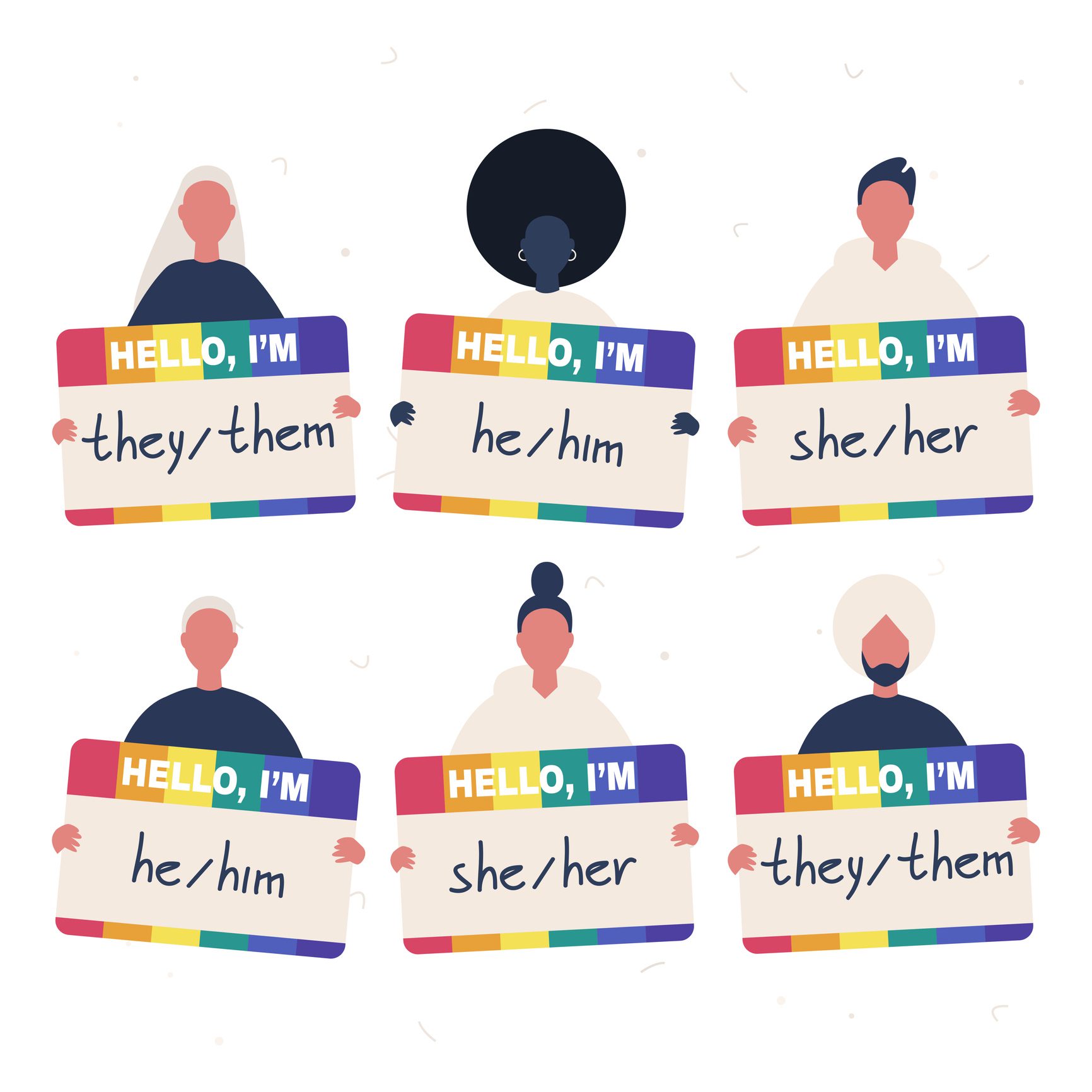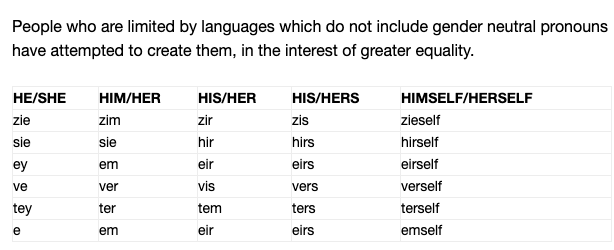Pronouns Are No Joking Matter

The Washington Post publishes an op-ed from a woman — apparently a bona fide vajayjay-haver — griping about her pro-o-o-o-o-nouns, and how people are making fun of pronoun Nazis. Here’s the headline of the Kat Jercich piece, which is about the slowest, fattest pitch over Uncle Chuckie’s home plate that ever was thrown:

Soon as I read that, I thought, “At some point, this dame is going to say the snickerers are accessories to murder.” And sure enough!:
It’s not appropriate for people who aren’t in danger of being fired, evicted or even murdered for their gender identity to decide that pronouns are a joking matter.
The entire column is a load of sanctimonious left-wing crap. For example:
In a society that frequently equates appearance with gender identity, it can be comforting for those who identify differently to push back against those assumptions, and it’s affirming to know that others are at least making an effort to do the same. Which is why it’s increasingly common, especially in spaces trying to demonstrate LGBTQ friendliness, to have people declare their pronouns upon introduction or in their email signatures: My name is Kat, I live in Chicago, and I use she or they pronouns. (As the writer Ada Powers recently pointed out on Twitter, this dual pronoun use can be a way for some non-binary people to express the complexities of their gender identity in different contexts and social settings.)
This practice has been routine in some activist spaces for more than a decade, but it’s moving into more mainstream arenas as well. Avinash Chak reported for the BBC in 2015 that “sharing one’s pronouns and asking for others’ pronouns when making introductions is a growing trend in US colleges.” Chak noted that the University of Vermont, “which has led this movement,” began asking students to self-report their pronouns in 2009. In job settings, too, more companies have made stating one’s pronouns a regular part of introductions. The employee analytics platform Culture Amp, which says it works with more than 2,500 organizations, advises workplaces to encourage employees to share pronouns in icebreakers; an NPR article recently did the same. Uber’s internal employee profile pages list their users’ pronouns.
If college student activists, NPR, and an HR website all agree that the world should do something, that’s a pretty good sign that people should do the opposite — or at least make fun of it. These wokesters force us all to walk on eggshells, constantly, for fear of being denounced or even fired for not accommodating their psychological wiggishness. True story: at one high school where a friend of mine’s kid went a couple of years ago, there was a biological female who considered herself “genderfluid,” and who would get mad at others if they called her by the wrong pronoun. She changed pronouns irregularly, and expected everybody to somehow know whether she was male or female or neuter that day. And the school accommodated this insanity!
This is a guide from the LGBTQ+ Center at the University of Wisconsin-Madison:

“Xemself”? Somebody demands that you say that to them, and you laugh, they deserve it. The Alphabet People Center at UWM has more suggestions:

What’s funny about this is the knots people twist themselves up into to avoid having to deal with the givenness of their bodies, and of the world — and, in turn, how spiteful they are towards people who don’t take their boutique problems as seriously as they themselves do.
Q: How many gender activists does it take to screw in a light bulb?
A: That’s not funny!
We can’t joke about this pronoun business because as far as activists and their media backers are concerned, we can’t question any of it at all. To do so is to be a bigot. A few days ago, Jo Swinson, the head of Britain’s super-woke Liberal Democratic Party, was asked serious, hard questions about gender and public policy during the closing days of the election campaign. The Lib Dems’ campaign platform called for writing some trans demands into low. Ella Whelan, a columnist for Spiked, writes about what happened:
In short, the Lib Dems have marked themselves out as the party that will heed the demands of extreme trans activists by reshaping laws, norms and truth itself.
This has all caused quite a stir. But it was a frosty exchange on the Today programme yesterday that really revealed just how extraordinary the Lib Dem view on gender has become. Swinson was asked if she believes that biological sex exists – that is, in the words of presenter Justin Webb, that ‘there are men and women, males and females’, and a ‘vanishingly small number of people who are indeterminate because of chromosomal abnormalities’.
Humbly repeating several times that she was ‘not a scientist’, Swinson insisted that things are not ‘as binary as is often presented’. She compared the discrimination against trans women – by which she means they are currently not legally allowed to become women through simple self-ID – to the treatment of gay people in the past. When pushed on the problem that automatic self-ID would compromise women-only spaces, including women’s refuges, Swinson said that individuals should be judged on a case-by-case basis.
More:
Thanks to historic fights for equality, it is now widely accepted that it is wrong to mistreat someone on the basis of how they talk, dress, who they sleep with or what they call themselves. We should continue to argue for everyone’s right to be who they want to be.
But this does not mean denying biology and smearing all opposing views as ‘bigoted’. Trans women are not automatically inclined to violence, as some of the more alarmist, so-called ‘TERFs’ might argue. However, removing medical and legal distinctions between the sexes does raise serious questions about the protection of sex-segregated spaces. Many commentators scoff at discussions of toilets or changing rooms as right-wing alarmism. But there are many women who are capable of being sympathetic to trans people while also wanting to maintain women-only spaces and opposing the idea of ‘gender neutrality’ in schools. They understand that sometimes gender and sex are important distinctions.
The debate around gender recognition has turned toxic. Disagree with someone like Swinson and you’ll be accused of conspiring in the demonisation of a vulnerable community. Thankfully, though, the Lib Dems’ views on gender are entirely unrepresentative of the public at large. Most people have a balanced take on these issues – it’s the mad platitudes from people like Swinson that make discussions of gender and freedom more difficult.
Look, it is wrong to bully people who suffer from gender dysphoria. It is wrong to bully people period. But activists and their allies construe any and all opposition to their theories and practices as bullying and bigotry. This is madness, and if we can’t laugh at the rigid extremes that they’re trying to impose on society — if we can’t make fun of any kind of their bullying of the rest of us — then that tells you something about what these woke totalitarians have in store for the rest of us. Sometimes, humor is the best way to resist something dangerous. I think we can all agree that Nazism is in most cases not a joking matter, but a world in which Mel Brooks’s hysterical satirical number “Springtime For Hitler,” from The Producers, is verboten is not a world that any of us should want to live in.
It is hilarious that the leader of a national political party cannot explain the difference between males and females, and says that to pose the question itself is bigoted. And it is also hilarious that her political party was wiped out in the election, and that she herself lost her seat in Parliament.
Beneath the laughter, though this is not a joke — but not in the way Jercich, the Post op-ed contributor, thinks. A reader posted this on a comments thread of this blog yesterday:
My 16-year-old daughter insists she’s “non-binary” and my 11-year-old daughter just announced she’s “gender fluid”. They’ve been raised in a stable, loving, Christian home. My older daughter has a small group of school friends and about half of them (the girls) have announced they’re boys, use male names and have boy haircuts and clothes. Some even wear chest binders, which my daughter says she really wants. Last month she announced that her friend Nathan “got his period today”. I hadn’t met Nathan yet and foolishly assumed he was a boy. Everything I’ve experienced about this topic lines up with what Lisa Littman (of Brown University) wrote about with regard to rapid-onset gender dysphoria, yet transgender activists had a tantrum when her paper was published and tried to shut it down. I need that information! A lot of us parents ARE talking about it because because suddenly transgenderism has become rampant among our kids, who up to puberty didn’t show any signs whatsoever. The kids aren’t necessarily the problem because every generation goes through silly fads; it’s the so-called adults who are pushing this so hard. I’m so angry; I feel like a lone voice in the wilderness insisting on biological reality.
The fanaticism of adults like Kat Jercich is driving radical changes in society, changes that destroy the lives of real people, and real families. And perhaps paradoxically, this is no joking matter. If the US news media want to be journalists, not advocates, then they ought to be asking politicians hard questions about these topics, and stop allowing the militancy of progressive activists define our discourse.
The Washington Post has a fresh op-ed up from an autism activist who denounces critics of the 16-year-old climate activist Greta Thunberg, who is on the autism spectrum, as — surprise! — bigots. Excerpts:
Even when autistic people are honored, like Thunberg was when she was named Time’s Person of the Year, we are immediately discredited as children, reinforcing the ideas that children and autistic people alike have no agency and our work is illegitimate.
Nope. People call Greta Thunberg a child not because she’s autistic, but because she’s 16 years old. More:
In my own work, I’ve witnessed denial of young autistic transgender people’s legitimacy from smarmy detractors who insist that they cannot possibly be both transgender and autistic because we have fallen victim to transgender adults with nefarious agendas who exploit our presumed susceptibility to manipulation.
Attacks on Thunberg that rely on claims that she is to be pitied and saved from adults may seem motivated by benevolent concern. But they only reinforce the ableist and ageist idea that children and autistic people lack agency and cannot exercise their own autonomy, which is wrong.
The attacks on Thunberg are also clearly gendered, as powerful women throughout history have been accused of existing only as pawns for men controlling them, and constantly face dismissal and delegitimization because of their righteous anger.
Oh, come off it. This is special pleading. It would certainly be cruel to mock Thunberg because of her autism, but Thunberg’s parents have chosen to allow her to take the world stage to advocate for her cause. She uses extreme rhetoric (e.g., in a co-bylined column a couple of weeks ago, she wrote “Colonial, racist, and patriarchal systems of oppression have created and fueled [the climate crisis]. We need to dismantle them all.”) But nobody can legitimately criticize any of this, according to the Post contributor, because doing so makes you bigoted against autistic people and women.
No, actually, it doesn’t. And it’s important not to allow ourselves to be intimidated by these manipulative activists. If telling a joke is a way of resisting this fanaticism, then by all means tell the joke. Laughter is subversive, and some things need to be subverted.
Subscribe for as little as $5/mo to start commenting on Rod’s blog.